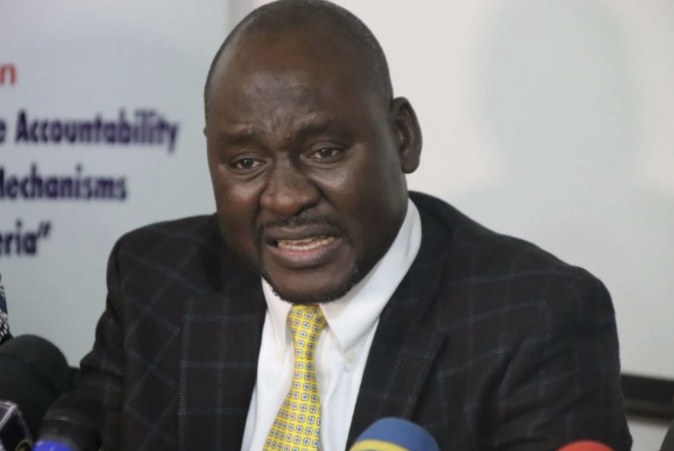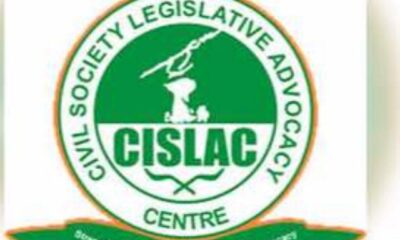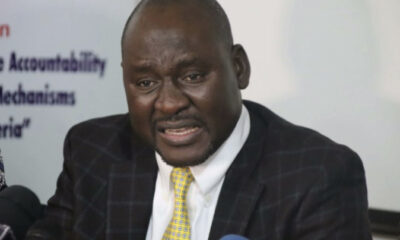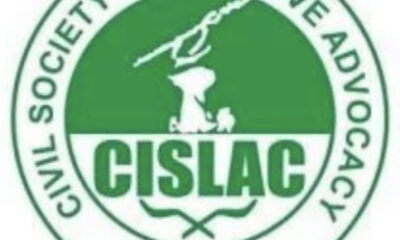News
CISLAC: Lake Chad Basin Governors Must Work Beyond Politics
Published
12 months agoon

The Civil Society Legislative Advocacy Centre (CISLAC) has commended the successful hosting of the Fifth Lake Chad Basin Governors’ Forum in Maiduguri and congratulated Governor Mai Mala Buni on his emergence as the new Chairman of the Forum.
In a statement signed by its Executive Director, Auwal Ibrahim Musa (Rafsanjani), CISLAC emphasized that the milestone reflects the collective commitment of regional leaders to tackling the pressing challenges affecting the Lake Chad Basin, including security, climate change, economic development, and humanitarian crises.
“We recognize and appreciate the United Nations Development Programme (UNDP), the African Union (AU), the European Union (EU), and the Lake Chad Basin Commission (LCBC) for their unwavering support of this initiative and their broader commitment to fostering peace, stability, and development across Africa,” CISLAC stated.
“Their role in strengthening regional governance, enhancing cross-border cooperation, and facilitating conflict resolution is critical in addressing the deep-rooted crises affecting communities in the Lake Chad Basin.”
At a time when tensions among ECOWAS member states pose a significant threat to regional stability, CISLAC urges all stakeholders to prioritize diplomacy, dialogue, and cooperation over conflict.
“A divided region weakens the collective ability to confront common challenges such as terrorism, climate change, and economic hardship. The Lake Chad Basin Governors’ Forum should serve as a model for regional cooperation, where shared interests outweigh individual political differences,” the organization noted.
CISLAC further highlighted that “the persistence of Boko Haram and ISWAP insurgency continues to threaten millions of lives across Nigeria, Chad, Cameroon, and Niger. While military efforts have played a crucial role, sustainable peace will only be achieved through stronger regional coordination, intelligence-sharing, and investment in community-led stabilization programs. The Forum must continue to push for better governance, socio-economic opportunities, and rehabilitation programs to counter extremist recruitment and reintegrate former combatants.”
On climate change, CISLAC warned that “the shrinking of Lake Chad, which has lost 90% of its original size since the 1960s, has led to water scarcity, displacement, and food insecurity, exacerbating conflicts in the region.
CISLAC calls for urgent climate adaptation policies, sustainable water management, and increased investment in climate resilience programs to protect the livelihoods of communities that depend on the lake. The international community must do more to support the region in adapting to the devastating impact of climate change.”
For the Lake Chad Basin Governors’ Forum to reach its full potential, CISLAC stresses the need for “stronger governance, sustainable funding mechanisms, and reinforced international support.” The organization advocates for “increased financial commitments from national governments, development partners, and regional bodies to implement peacebuilding and development projects.”
Additionally, CISLAC calls for “stronger political will to implement cross-border security agreements and ensure the free movement of people and goods within the region. The removal of trade barriers is also necessary to boost regional free trade, enhance economic integration, and create sustainable jobs, reducing youth vulnerability to radicalization.”
CISLAC urges all stakeholders—governments, regional organizations, civil society, and international partners—to support the Lake Chad Basin Governors’ Forum as a vital platform for regional peace, stability, and economic transformation.
“Now is the time for renewed commitment, greater accountability, and inclusive governance to ensure that no community in the Lake Chad region is left behind,” the organization concluded.
You may like
-


CISLAC commends ICPC over conviction of UNICAL dean for sexual harassment
-


CISLAC condemns Wike’s Attack on Armed Forces as Nigeria Faces International Scrutiny
-


CISLAC commends EFCC for landmark arrest of foreign cybercrime syndicate
-


CISLAC Demands Immediate Compliance with Public Service Rules in Police Leadership, Calls for Urgent Legislative Review
-


CISLAC Calls for probe into Abuja- Kaduna Highway contract awarded to inactive company

Gov Yusuf Pledges To Strengthen Synergy With Police

President Tinubu approves posting of 4 ambassador-designates

Why I enrolled for law degree in state university – Emir Sanusi

Kano-based female journalist gets African media network appointment

JUST IN: FG approves increase in electricity tariff


